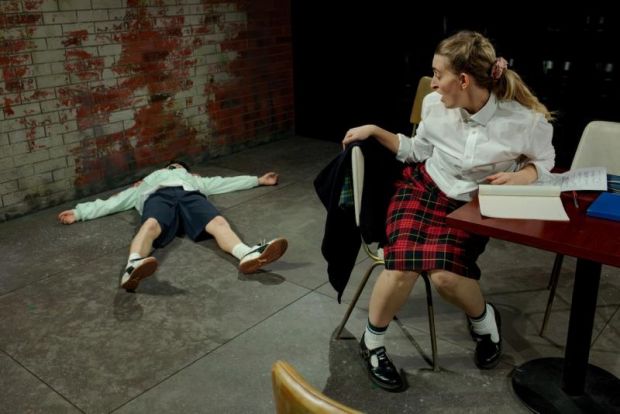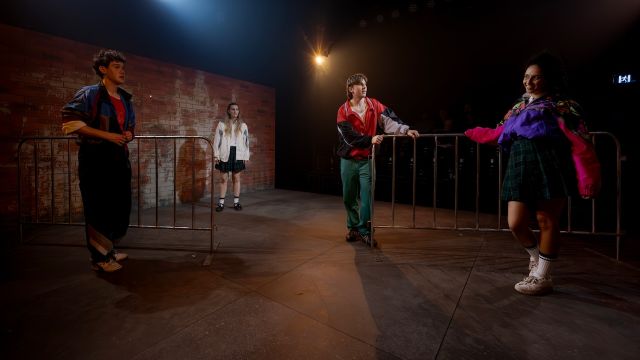Port
This is the Australian première of one of prolific British playwright Simon Stephens’ earliest plays – and the inaugural production of December Theatre Company. Two firsts, both impressive. Stephens’ play is visceral and fiery. DTC meets it head on a tight, gutsy production that augurs well for the company’s future.
First performed in 2002, Port is set in a working class town in Manchester. It takes its characters from teenagers in 1988 to the close of the century and into 2002. Life is not easy for them as kids … or adults. The play centres around Racheal and her struggle to do the right thing while life crashes around her.
The writing is raw. Stephens paints his characters with a strong, dry brush. Their life is hard but they face it with restless relentless energy. Stephens captures that in dialogue that is blunt, “colourful’, the Mancunian accent clear in shortened words, incorrect grammar, short sentences, repetition, pauses. They are characters of their time and place. Stephens makes them vividly authentic and director Nigel Turner-Carroll finds that authenticity in a production that is taut, tight, pacy and simmers with tense, electric energy.
Turner-Carroll identifies with the “tough, sometimes suffocating” contradictions of such a time and place. His insight into the characters and how they relate is transferred to his cast and the creatives who transform the limited stage space into a repressive, stifling environment that pulls the audience into every moment. It impossible not to identify with the characters in this space, and to feel their anger, hurt, frustrations - and their courage and resilience.

The set is simple. Designer SohamApte suggests the town with two graffiti-blotched terracotta brick walls. Props – chairs, the broken grill of a car, iron railings, a clothes rack, a mini fridge – carried or wheeled on by the cast and crew quickly and effectively suggest changes of scene and place which are then heighted by Travis Kecek’s lighting and Cameron Smith’s sound design.
This production is pared back to concentrate on the characters and their lives. But this doesn’t mean the stage is dull. Lighting – and the imagination of costume designer Benedict Janeczko-Taylor colours the mood of each scene expressively, taking the characters through the fourteen years the play spans.
Those characters, deftly drawn by Stephens, come to expressive life under Turner-Carroll’s perceptive insight and direction. He has ensured the veracity of their accents with the assistance of vocal and dialect coach Patrick Klavins so the pace and rhythm of the Mancunian accent is sustained throughout the play, broadly in tense arguments and fights as youngsters, changing imperceptibly as the characters mature.
Grace Stamnas sustains an extraordinary performance as Racheal. Firstly as an eleven-year-old as she and her brother Billy spend the night with their mother in a car having been locked out by the father. The dialogue in this scene is cleverly written and Stamnas controls its rhythms carefully as she teases Billy or quizzes her mother, played with growing impatience – and a sense of growing tension – by Megan O’Connell.

Except for one transgression, Stamnas sustains Racheals’ sense of right and wrong: from adolescence to maturity; from young love to an oppressive marriage. Even in the tenseness of her marriage, there is an inner strength that buoys her. Her constancy and steadfastness are evident in her love and support for Billy and the closeness of their relationship.
Owen Hasluck gives an outstanding performance as Billy. Whether as a whining, over-active “little brother” or a wild, unruly teenager, his performance is explosive. There is mad energy and wilful self-destruction in the reckless character he sustains as he throws himself around the stage, inciting others, teasing Racheal, steaming himself into trouble … from which he emerges older but still restless, and totally lovable.
The other teenagers, Chris, Danny and Lucy are played by Finn Middleton, James Collins and Rachel Crossan. They match Billy’s energy and wildness – and try their best to tempt Racheal to join them.
Danny returns later as her first love – and after she returns to town sometime after her failed marriage. This scene is gentle and sad. James Collins makes Danny considerate and caring, whether as a loving honourable teenager, or an understanding friend … but faithful, loyal husband.
Megan O’Connell doubles in the role of Anne, Racheal’s grandmother. In a wheelchair, her sight and hearing impaired, O’Connell makes Anne vulnerable, albeit cunning – until Racheal takes advantage of her.

Kyle Barrett plays both the negligent father, and Racheal’s jealous, accusing, abusive husband Kevin – and Benjamin Louttit plays the strange Ronald and a fast-food store manager.
Even the small roles in this play are pertinent to the themes. Every character adds depth to the 14 years of the story … and Racheal’s life. The direction ensures the importance of each phase in time and the changes it brings. Scene changes are planned and rehearsed as carefully as the action. They are smooth and quick – and one, involving the whole cast and crew, takes the scene from a tense hotel room to a brief moment in a bar, then quickly to the courtyard outside. It is easy to miss that quick moment, but it’s a clever piece of choreography.
Though Port is a play of its time, its themes resound just as loudly for young people today as they did for Simon Stephens’ characters in the approach to 2000. Nigel Turner-Carroll and his cast make those themes very clear in this wild, brash play that “pulses with hope, resilience and rage”.
Carol Wimmer
Photographer: Phil Erbacher
Subscribe to our E-Newsletter, buy our latest print edition or find a Performing Arts book at Book Nook.

